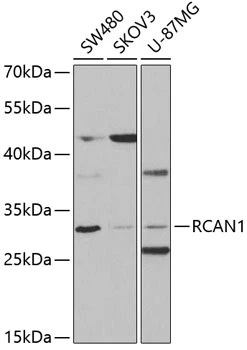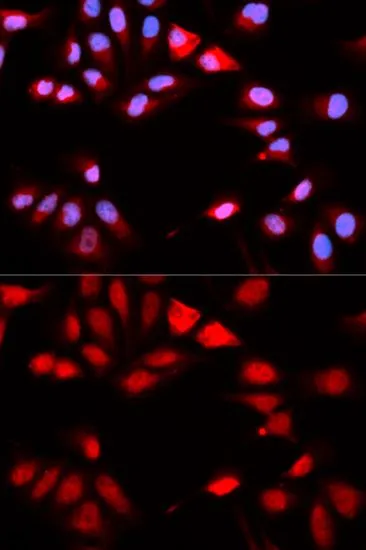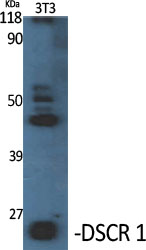
WB analysis of various sample lysates using GTX33055 Calcipressin 1 antibody. Dilution : 1:1000 Loading : 25microg per lane
Calcipressin 1 antibody
GTX33055
ApplicationsImmunoFluorescence, Western Blot, ImmunoCytoChemistry
Product group Antibodies
ReactivityHuman
TargetRCAN1
Overview
- SupplierGeneTex
- Product NameCalcipressin 1 antibody
- Delivery Days Customer9
- Application Supplier NoteWB: 1:500 - 1:2000. ICC/IF: 1:20 - 1:50. *Optimal dilutions/concentrations should be determined by the researcher.Not tested in other applications.
- ApplicationsImmunoFluorescence, Western Blot, ImmunoCytoChemistry
- CertificationResearch Use Only
- ClonalityPolyclonal
- ConjugateUnconjugated
- Gene ID1827
- Target nameRCAN1
- Target descriptionregulator of calcineurin 1
- Target synonymsADAPT78, CSP1, DSC1, DSCR1, MCIP1, RCN1, calcipressin-1, Down syndrome candidate region 1, Down syndrome critical region gene 1, calcium and oxidant-inducible mRNA, modulatory calcineurin-interacting protein 1, myocyte-enriched calcineurin-interacting protein 1, near DSCR proline-rich protein
- HostRabbit
- IsotypeIgG
- Protein IDP53805
- Protein NameCalcipressin-1
- Scientific DescriptionThe protein encoded by this gene interacts with calcineurin A and inhibits calcineurin-dependent signaling pathways, possibly affecting central nervous system development. This gene is located in the minimal candidate region for the Down syndrome phenotype, and is overexpressed in the brain of Down syndrome fetuses. Chronic overexpression of this gene may lead to neurofibrillary tangles such as those associated with Alzheimer disease. Alternative splicing results in multiple transcript variants. [provided by RefSeq, Nov 2013]
- ReactivityHuman
- Storage Instruction-20°C or -80°C,2°C to 8°C
- UNSPSC12352203








